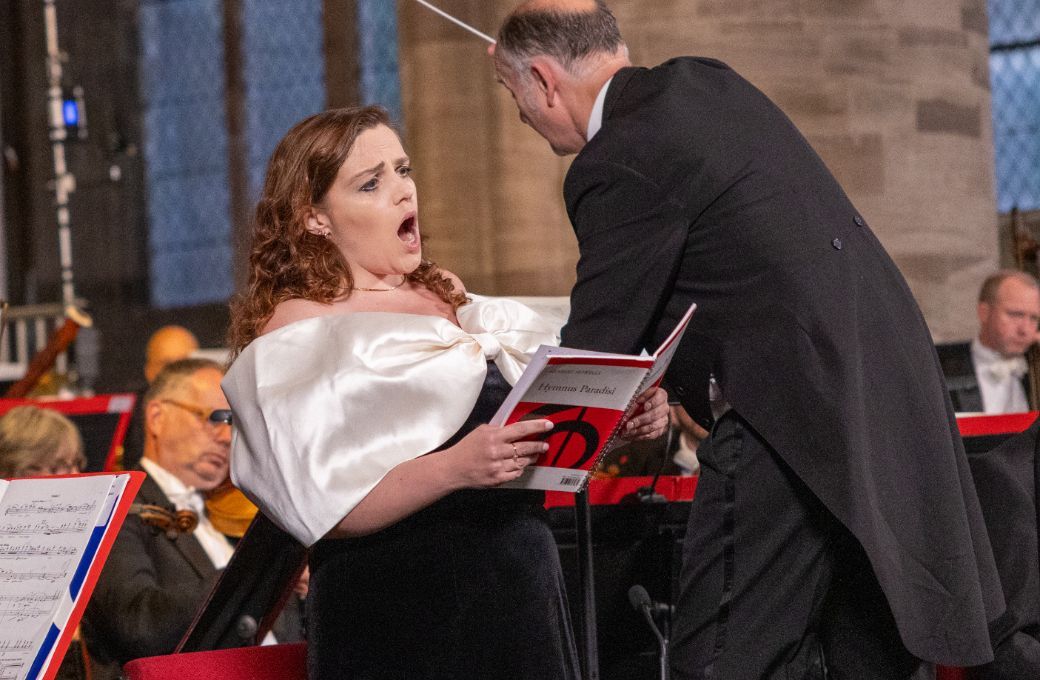Now in its 297th year, the Three Choirs Festival has an unrivalled history rooted firmly in British choral music. Wednesday evening’s concert was no exception and featured three works premiered at the festival at various times during the last century: Howells’ Paradise Rondel (1925) and Hymnus Paradisi (1950) and Bliss’ Mary of Magdala (1963).
If an examination of grief and its almost paradoxical relationship with paradise linked much of the programme. Howells’ seldom heard orchestral Paradise Rondel was by turns a rapturous and poignant starting point. Its title derives from the name of the Cotswold hamlet about which he once commented “Paradise is a good walking place, full of tunes for those who can hear them”. A relatively early work, its music is unmistakably English with modal inflections that might belong to Holst or Vaughan Williams. Under Adrian Partington’s baton, the Philharmonia Orchestra presented a glowing account of unfailing interest with sparkling contributions from woodwinds, piano and harp, with heartwarming additions from solo violin and viola.
No less English sounding is the seldom heard cantata Mary of Magdala by the once Master of the Queen’s Music Sir Arthur Bliss whose death 50 years ago is commemorated throughout this festival. Written for mezzo and baritone soloists, chorus and orchestra, it became his last choral work and final collaboration with the librettist Christopher Hassall to whom the work is dedicated. Its poetic narrative, drawn largely from an episode in St John’s Gospel and interwoven with 17th-century verse by Edward Sherburne and Rowland Watkins, is fashioned by Mary of Magdala’s discovery of Christ’s empty tomb, her grief turning to joy as she eventually recognises him as the risen Lord in the Easter Garden.
Bliss’ sinuous choral lines are no easy task, but the Festival Chorus were fully equal to the occasional challenges. An impressive unanimity of tone from them shaped the work’s initial solemnity, the chorus later splendidly vivid when mocking Mary as “a shameless harlot” and by the end voices were touchingly consoling. I couldn’t help wondering if Bliss wanted to write for a mezzo or a contralto soloist, the wide-ranging and sometimes angular lines here seemed no longer ideal for Dame Sarah Connolly whose undeniably fervent tone was under-projected, her lower register often obscured by the Philharmonia players. That aside, hers was a heartfelt performance sung with tremendous conviction, with a gratifying contribution from baritone Malachy Frame as the voice of Christ. Balance issues aside, this was a moving account, its radiance and intimacy fully realised.

Those qualities, and more, arrived in an emotionally-charged rendition of Hymnus Paradisi – a work unfolding across its 45 minutes as an ecstatic contemplation, generally considered to be Howells’ masterpiece. With its emphasis on consolation and everlasting rest, some have found correspondences with Brahms’ German Requiem. Written as an outpouring of grief after the death of his nine-year-old son, Hymnus Paradisi is an ardent expression of pain, of “emotion recollected in tranquillity”, its score remaining untouched after its completion in 1934 until its Gloucester premiere some twelve years later.
If singers struggled with the long-breathed contrapuntal lines and chromatic harmonies in early performances, there were no insecurities here. The Festival Chorus fully rose to the occasion and sang with absolute certainty, the work’s dense textures cleanly rendered and light-filled. The Sanctus was remarkably buoyant and thrillingly passionate in its intensity, and the repeated “Alleluias” of “Holy is the true ligh” devastatingly climactic. Rebecca Hardwick (soprano) and Michael Bell (tenor) proved to be well-chosen soloists, while much sensitivity was coaxed from the Philharmonia. A revelatory performance.


